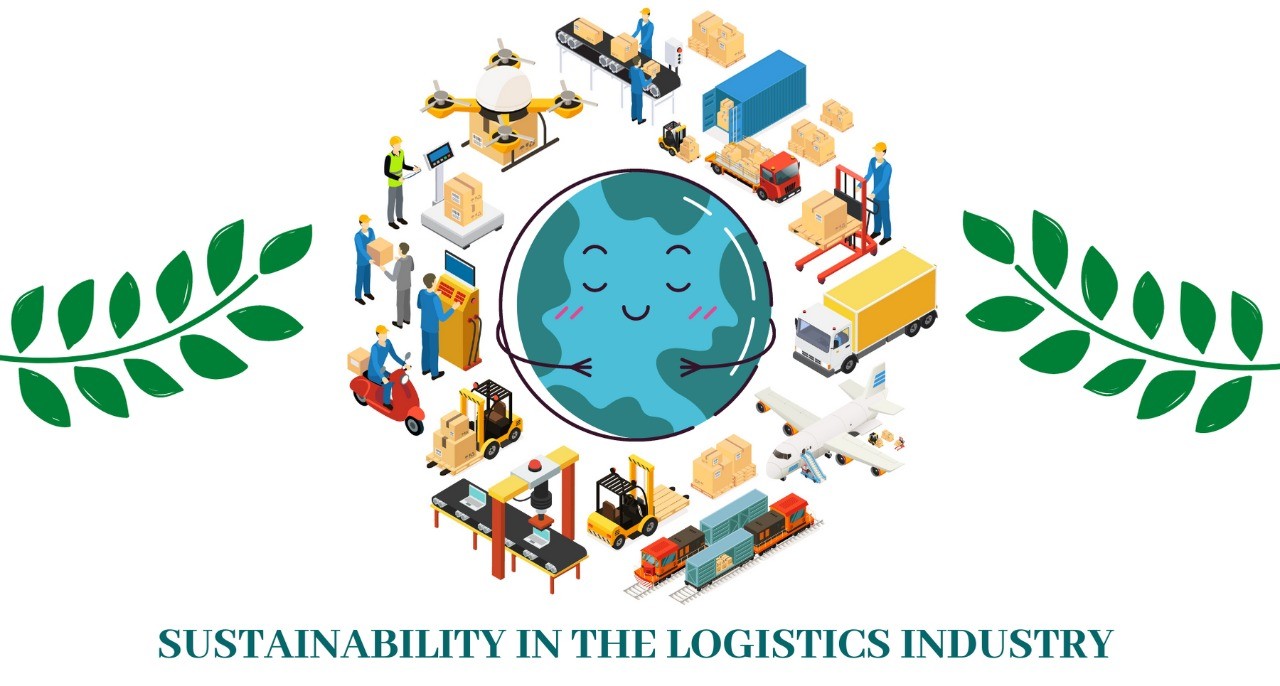Eco-friendly shipping is becoming increasingly important in the logistics industry as businesses aim to reduce their environmental impact. Sustainable trends within the industry are emerging as companies recognize the need to implement environmentally-friendly shipping practices. Here are some of the key sustainability trends in the logistics industry today.
1. Use of Electric Vehicles
One of the most prominent eco-friendly shipping trends is the use of electric vehicles. Many delivery companies are now using electric vans and trucks for last-mile deliveries. Electric vehicles offer numerous environmental benefits, such as reducing air pollution, noise pollution, and carbon emissions.
2. Sustainable Packaging
Sustainable packaging is another major trend in the logistics industry. Many companies are using eco-friendly materials in their packaging, such as recycled cardboard and biodegradable plastics. Additionally, some businesses are exploring new and innovative packaging solutions, such as reusable shipping containers and biodegradable packing peanuts.
3. Carbon Offsetting
Carbon offsetting is a practice used by many logistics companies to reduce their carbon footprint. It involves investing in initiatives that reduce carbon emissions in other parts of the world, such as renewable energy projects or reforestation programs. Carbon offsetting is an effective way for businesses to balance out their carbon emissions and work towards achieving carbon neutrality.
4. Enhancing Supply Chain Transparency
Supply chain transparency is emerging as another important trend in the logistics industry. By providing customers with information about their products’ supply chain, companies can demonstrate their commitment to sustainability. This not only helps build trust with customers but also encourages suppliers to implement more sustainable practices.
5. Optimizing Transportation Networks
Finally, optimizing transportation networks is a key trend in sustainable logistics. This involves reducing the number of empty miles that delivery trucks or shipping containers travel. By optimizing their transportation networks, businesses can reduce fuel consumption, carbon emissions, and transportation costs.
In conclusion, eco-friendly shipping is becoming increasingly important in the logistics industry as companies aim to reduce their environmental impact. By adopting sustainable practices such as the use of electric vehicles, carbon offsetting, and optimizing transportation networks, businesses can work towards achieving their sustainability goals while still delivering products to their customers efficiently. As consumers become increasingly environmentally-conscious, companies that prioritize sustainability will be better positioned to meet customer demand and succeed in the long run.
https://indidesignhome.my.id/
https://indidesignhome.my.id/
https://indidesignhome.my.id/
https://indidesignhome.my.id/
https://indidesignhome.my.id/
https://indidesignhome.my.id/
https://indidesignhome.my.id/
https://indidesignhome.my.id/
https://indidesignhome.my.id/
https://indidesignhome.my.id/
https://indidesignhome.my.id/
https://indidesignhome.my.id/
https://indidesignhome.my.id/
https://indidesignhome.my.id/
https://indidesignhome.my.id/
https://indidesignhome.my.id/
https://indidesignhome.my.id/
https://indidesignhome.my.id/
https://indidesignhome.my.id/
https://indidesignhome.my.id/
https://indidesignhome.my.id/
https://indidesignhome.my.id/
https://indidesignhome.my.id/
https://indidesignhome.my.id/
https://indidesignhome.my.id/
https://indidesignhome.my.id/
https://indidesignhome.my.id/
https://indidesignhome.my.id/
https://indidesignhome.my.id/
https://indidesignhome.my.id/
https://indidesignhome.my.id/
https://indidesignhome.my.id/
https://indidesignhome.my.id/
https://indidesignhome.my.id/
https://indidesignhome.my.id/
https://indidesignhome.my.id/
https://indidesignhome.my.id/
https://indidesignhome.my.id/
https://indidesignhome.my.id/
https://indidesignhome.my.id/
https://indidesignhome.my.id/
https://indidesignhome.my.id/
https://indidesignhome.my.id/
https://indidesignhome.my.id/
https://indidesignhome.my.id/
https://indidesignhome.my.id/
https://indidesignhome.my.id/
https://indidesignhome.my.id/
https://indidesignhome.my.id/
https://indidesignhome.my.id/
https://indidesignhome.my.id/
https://indidesignhome.my.id/
https://indidesignhome.my.id/
https://indidesignhome.my.id/
https://indidesignhome.my.id/
https://indidesignhome.my.id/
https://indidesignhome.my.id/
https://indidesignhome.my.id/
https://indidesignhome.my.id/
https://indidesignhome.my.id/
https://indidesignhome.my.id/
https://indidesignhome.my.id/
https://indidesignhome.my.id/
https://indidesignhome.my.id/
https://indidesignhome.my.id/
https://indidesignhome.my.id/
https://indidesignhome.my.id/
https://indidesignhome.my.id/
https://indidesignhome.my.id/
https://indidesignhome.my.id/
https://indidesignhome.my.id/
https://indidesignhome.my.id/
https://indidesignhome.my.id/
https://indidesignhome.my.id/
https://indidesignhome.my.id/
https://indidesignhome.my.id/
https://indidesignhome.my.id/
https://indidesignhome.my.id/
https://indidesignhome.my.id/
https://indidesignhome.my.id/
https://indidesignhome.my.id/
https://indidesignhome.my.id/
https://indidesignhome.my.id/
https://indidesignhome.my.id/
https://indidesignhome.my.id/
https://indidesignhome.my.id/
https://indidesignhome.my.id/
https://indidesignhome.my.id/
https://indidesignhome.my.id/
https://indidesignhome.my.id/
https://indidesignhome.my.id/
https://indidesignhome.my.id/
https://indidesignhome.my.id/
https://indidesignhome.my.id/
https://indidesignhome.my.id/
https://indidesignhome.my.id/
https://indidesignhome.my.id/
https://indidesignhome.my.id/
https://indidesignhome.my.id/
https://indidesignhome.my.id/
https://indidesignhome.my.id/
https://indidesignhome.my.id/
https://indidesignhome.my.id/
https://indidesignhome.my.id/
https://indidesignhome.my.id/
https://indidesignhome.my.id/
https://indidesignhome.my.id/
https://indidesignhome.my.id/
https://indidesignhome.my.id/
https://indidesignhome.my.id/
https://indidesignhome.my.id/
https://indidesignhome.my.id/
https://indidesignhome.my.id/
https://indidesignhome.my.id/
https://indidesignhome.my.id/
https://indidesignhome.my.id/
https://indidesignhome.my.id/
https://indidesignhome.my.id/
https://indidesignhome.my.id/
https://indidesignhome.my.id/
https://indidesignhome.my.id/
https://indidesignhome.my.id/
https://indidesignhome.my.id/
https://indidesignhome.my.id/
https://indidesignhome.my.id/
https://indidesignhome.my.id/
https://indidesignhome.my.id/
https://indidesignhome.my.id/
https://indidesignhome.my.id/
https://indidesignhome.my.id/
https://indidesignhome.my.id/
https://indidesignhome.my.id/
https://indidesignhome.my.id/
https://indidesignhome.my.id/
https://indidesignhome.my.id/
https://indidesignhome.my.id/
https://indidesignhome.my.id/
https://indidesignhome.my.id/
https://indidesignhome.my.id/
https://indidesignhome.my.id/
https://indidesignhome.my.id/
https://indidesignhome.my.id/
https://indidesignhome.my.id/
https://indidesignhome.my.id/
https://indidesignhome.my.id/
https://indidesignhome.my.id/
https://indidesignhome.my.id/
https://indidesignhome.my.id/
https://indidesignhome.my.id/
https://indidesignhome.my.id/
https://indidesignhome.my.id/
https://indidesignhome.my.id/
https://indidesignhome.my.id/
https://indidesignhome.my.id/
https://indidesignhome.my.id/
https://indidesignhome.my.id/
https://indidesignhome.my.id/
https://indidesignhome.my.id/
https://indidesignhome.my.id/
https://indidesignhome.my.id/
https://indidesignhome.my.id/
https://indidesignhome.my.id/
https://indidesignhome.my.id/
https://indidesignhome.my.id/
https://indidesignhome.my.id/
https://indidesignhome.my.id/
https://indidesignhome.my.id/
https://indidesignhome.my.id/
https://indidesignhome.my.id/
https://indidesignhome.my.id/
https://indidesignhome.my.id/
https://indidesignhome.my.id/
https://indidesignhome.my.id/
https://indidesignhome.my.id/
https://indidesignhome.my.id/
https://indidesignhome.my.id/
https://indidesignhome.my.id/
https://indidesignhome.my.id/
https://indidesignhome.my.id/
https://indidesignhome.my.id/
https://indidesignhome.my.id/
https://indidesignhome.my.id/
https://indidesignhome.my.id/
https://indidesignhome.my.id/
https://indidesignhome.my.id/
https://indidesignhome.my.id/
https://indidesignhome.my.id/
https://indidesignhome.my.id/
https://indidesignhome.my.id/
https://indidesignhome.my.id/
https://indidesignhome.my.id/
https://indidesignhome.my.id/
https://indidesignhome.my.id/
https://indidesignhome.my.id/
https://indidesignhome.my.id/
https://indidesignhome.my.id/
https://indidesignhome.my.id/
https://indidesignhome.my.id/
https://indidesignhome.my.id/
https://indidesignhome.my.id/
https://indidesignhome.my.id/
https://indidesignhome.my.id/
https://indidesignhome.my.id/
https://indidesignhome.my.id/
https://indidesignhome.my.id/
https://indidesignhome.my.id/
https://indidesignhome.my.id/
https://indidesignhome.my.id/
https://indidesignhome.my.id/
https://indidesignhome.my.id/
https://indidesignhome.my.id/
https://indidesignhome.my.id/
https://indidesignhome.my.id/
https://indidesignhome.my.id/
https://indidesignhome.my.id/
https://indidesignhome.my.id/
https://indidesignhome.my.id/
https://indidesignhome.my.id/
https://indidesignhome.my.id/
https://indidesignhome.my.id/
https://indidesignhome.my.id/
https://indidesignhome.my.id/
https://indidesignhome.my.id/
https://indidesignhome.my.id/
https://indidesignhome.my.id/
https://indidesignhome.my.id/
https://indidesignhome.my.id/
https://indidesignhome.my.id/
https://indidesignhome.my.id/
https://indidesignhome.my.id/
https://indidesignhome.my.id/
https://indidesignhome.my.id/
https://indidesignhome.my.id/
https://indidesignhome.my.id/
https://indidesignhome.my.id/
https://indidesignhome.my.id/
https://indidesignhome.my.id/
https://indidesignhome.my.id/
https://indidesignhome.my.id/
https://indidesignhome.my.id/
https://indidesignhome.my.id/
https://indidesignhome.my.id/
https://indidesignhome.my.id/
https://indidesignhome.my.id/
https://indidesignhome.my.id/
https://indidesignhome.my.id/
https://indidesignhome.my.id/
https://indidesignhome.my.id/
https://indidesignhome.my.id/
https://indidesignhome.my.id/
https://indidesignhome.my.id/
https://indidesignhome.my.id/
https://indidesignhome.my.id/
https://indidesignhome.my.id/
https://indidesignhome.my.id/
https://indidesignhome.my.id/
https://indidesignhome.my.id/
https://indidesignhome.my.id/
https://indidesignhome.my.id/
https://indidesignhome.my.id/
https://indidesignhome.my.id/
https://indidesignhome.my.id/
https://indidesignhome.my.id/
https://indidesignhome.my.id/
https://indidesignhome.my.id/
https://indidesignhome.my.id/
https://indidesignhome.my.id/
https://indidesignhome.my.id/
https://indidesignhome.my.id/
https://indidesignhome.my.id/
https://indidesignhome.my.id/
https://indidesignhome.my.id/
https://indidesignhome.my.id/
https://indidesignhome.my.id/
https://indidesignhome.my.id/
https://indidesignhome.my.id/
https://indidesignhome.my.id/
https://indidesignhome.my.id/
https://indidesignhome.my.id/
https://indidesignhome.my.id/
https://indidesignhome.my.id/
https://indidesignhome.my.id/
https://indidesignhome.my.id/
https://indidesignhome.my.id/
https://indidesignhome.my.id/
https://indidesignhome.my.id/
https://indidesignhome.my.id/
https://indidesignhome.my.id/
https://indidesignhome.my.id/
https://indidesignhome.my.id/
https://indidesignhome.my.id/
https://indidesignhome.my.id/
https://indidesignhome.my.id/
https://indidesignhome.my.id/
https://indidesignhome.my.id/
https://indidesignhome.my.id/
https://indidesignhome.my.id/
https://indidesignhome.my.id/
https://indidesignhome.my.id/
https://indidesignhome.my.id/
https://indidesignhome.my.id/
https://indidesignhome.my.id/
https://indidesignhome.my.id/
https://indidesignhome.my.id/
https://indidesignhome.my.id/
https://indidesignhome.my.id/
https://indidesignhome.my.id/
https://indidesignhome.my.id/
https://indidesignhome.my.id/
https://indidesignhome.my.id/
https://indidesignhome.my.id/
https://indidesignhome.my.id/
https://indidesignhome.my.id/
https://indidesignhome.my.id/
https://indidesignhome.my.id/
https://indidesignhome.my.id/
https://indidesignhome.my.id/
https://indidesignhome.my.id/
https://indidesignhome.my.id/
https://indidesignhome.my.id/
https://indidesignhome.my.id/
https://indidesignhome.my.id/
https://indidesignhome.my.id/
https://indidesignhome.my.id/
https://indidesignhome.my.id/
https://indidesignhome.my.id/
https://indidesignhome.my.id/
https://indidesignhome.my.id/
https://indidesignhome.my.id/
https://indidesignhome.my.id/
https://indidesignhome.my.id/
https://indidesignhome.my.id/
https://indidesignhome.my.id/
https://indidesignhome.my.id/
https://indidesignhome.my.id/
https://indidesignhome.my.id/
https://indidesignhome.my.id/
https://indidesignhome.my.id/
https://indidesignhome.my.id/
https://indidesignhome.my.id/
https://indidesignhome.my.id/
https://indidesignhome.my.id/
https://indidesignhome.my.id/
https://indidesignhome.my.id/
https://indidesignhome.my.id/
https://indidesignhome.my.id/
https://indidesignhome.my.id/
https://indidesignhome.my.id/
https://indidesignhome.my.id/
https://indidesignhome.my.id/
https://indidesignhome.my.id/
https://indidesignhome.my.id/
https://indidesignhome.my.id/
https://indidesignhome.my.id/
https://indidesignhome.my.id/
https://indidesignhome.my.id/
https://indidesignhome.my.id/
https://indidesignhome.my.id/
https://indidesignhome.my.id/
https://indidesignhome.my.id/
https://indidesignhome.my.id/
https://indidesignhome.my.id/
https://indidesignhome.my.id/
https://indidesignhome.my.id/
https://indidesignhome.my.id/
https://indidesignhome.my.id/
https://indidesignhome.my.id/
https://indidesignhome.my.id/
https://indidesignhome.my.id/
https://indidesignhome.my.id/
https://indidesignhome.my.id/
https://indidesignhome.my.id/
https://indidesignhome.my.id/
https://indidesignhome.my.id/
https://indidesignhome.my.id/
https://indidesignhome.my.id/
https://indidesignhome.my.id/
https://indidesignhome.my.id/
https://indidesignhome.my.id/
https://indidesignhome.my.id/
https://indidesignhome.my.id/
https://indidesignhome.my.id/
https://indidesignhome.my.id/
https://indidesignhome.my.id/
https://indidesignhome.my.id/
https://indidesignhome.my.id/
https://indidesignhome.my.id/
https://indidesignhome.my.id/
https://indidesignhome.my.id/
https://indidesignhome.my.id/
https://indidesignhome.my.id/
https://indidesignhome.my.id/
https://indidesignhome.my.id/
https://indidesignhome.my.id/
https://indidesignhome.my.id/
https://indidesignhome.my.id/
https://indidesignhome.my.id/
https://indidesignhome.my.id/
https://indidesignhome.my.id/
https://indidesignhome.my.id/
https://indidesignhome.my.id/
https://indidesignhome.my.id/
https://indidesignhome.my.id/
https://indidesignhome.my.id/
https://indidesignhome.my.id/
https://indidesignhome.my.id/
https://indidesignhome.my.id/
https://indidesignhome.my.id/
https://indidesignhome.my.id/
https://indidesignhome.my.id/
https://indidesignhome.my.id/
https://indidesignhome.my.id/
https://indidesignhome.my.id/
https://indidesignhome.my.id/
https://indidesignhome.my.id/
https://indidesignhome.my.id/
https://indidesignhome.my.id/
https://indidesignhome.my.id/
https://indidesignhome.my.id/
https://indidesignhome.my.id/
https://indidesignhome.my.id/
https://indidesignhome.my.id/
https://indidesignhome.my.id/
https://indidesignhome.my.id/
https://indidesignhome.my.id/
https://indidesignhome.my.id/
https://indidesignhome.my.id/
https://indidesignhome.my.id/
https://indidesignhome.my.id/
https://indidesignhome.my.id/
https://indidesignhome.my.id/
https://indidesignhome.my.id/
https://indidesignhome.my.id/
https://indidesignhome.my.id/
https://indidesignhome.my.id/
https://indidesignhome.my.id/
https://indidesignhome.my.id/
https://indidesignhome.my.id/
https://indidesignhome.my.id/
https://indidesignhome.my.id/
https://indidesignhome.my.id/
https://indidesignhome.my.id/
https://indidesignhome.my.id/
https://indidesignhome.my.id/
https://indidesignhome.my.id/
https://indidesignhome.my.id/
https://indidesignhome.my.id/
https://indidesignhome.my.id/
https://indidesignhome.my.id/
https://indidesignhome.my.id/
https://indidesignhome.my.id/
https://indidesignhome.my.id/
https://indidesignhome.my.id/
https://indidesignhome.my.id/
https://indidesignhome.my.id/
https://indidesignhome.my.id/
https://indidesignhome.my.id/
https://indidesignhome.my.id/
https://indidesignhome.my.id/
https://indidesignhome.my.id/
https://indidesignhome.my.id/
https://indidesignhome.my.id/
https://indidesignhome.my.id/
https://indidesignhome.my.id/
https://indidesignhome.my.id/
https://indidesignhome.my.id/
https://indidesignhome.my.id/
https://indidesignhome.my.id/
https://indidesignhome.my.id/
https://indidesignhome.my.id/
https://indidesignhome.my.id/
https://indidesignhome.my.id/
https://indidesignhome.my.id/
https://indidesignhome.my.id/
https://indidesignhome.my.id/
https://indidesignhome.my.id/
https://indidesignhome.my.id/
https://indidesignhome.my.id/
https://indidesignhome.my.id/
https://indidesignhome.my.id/
https://indidesignhome.my.id/
https://indidesignhome.my.id/
https://indidesignhome.my.id/
https://indidesignhome.my.id/
https://indidesignhome.my.id/
https://indidesignhome.my.id/
https://indidesignhome.my.id/
https://indidesignhome.my.id/
https://indidesignhome.my.id/
https://indidesignhome.my.id/
https://indidesignhome.my.id/
https://indidesignhome.my.id/
https://indidesignhome.my.id/
https://indidesignhome.my.id/
https://indidesignhome.my.id/
https://indidesignhome.my.id/
https://indidesignhome.my.id/
https://indidesignhome.my.id/
https://indidesignhome.my.id/
https://indidesignhome.my.id/
https://indidesignhome.my.id/
https://indidesignhome.my.id/
https://indidesignhome.my.id/
https://indidesignhome.my.id/
https://indidesignhome.my.id/
https://indidesignhome.my.id/
https://indidesignhome.my.id/
https://indidesignhome.my.id/
https://indidesignhome.my.id/
https://indidesignhome.my.id/
https://indidesignhome.my.id/
https://indidesignhome.my.id/
https://indidesignhome.my.id/
https://indidesignhome.my.id/
https://indidesignhome.my.id/
https://indidesignhome.my.id/
https://indidesignhome.my.id/
https://indidesignhome.my.id/
https://indidesignhome.my.id/
https://indidesignhome.my.id/
https://indidesignhome.my.id/
https://indidesignhome.my.id/
https://indidesignhome.my.id/
https://indidesignhome.my.id/
https://indidesignhome.my.id/
https://indidesignhome.my.id/
https://indidesignhome.my.id/
https://indidesignhome.my.id/
https://indidesignhome.my.id/
https://indidesignhome.my.id/
https://indidesignhome.my.id/
https://indidesignhome.my.id/
https://indidesignhome.my.id/
https://indidesignhome.my.id/
https://indidesignhome.my.id/
https://indidesignhome.my.id/
https://indidesignhome.my.id/
https://indidesignhome.my.id/
https://indidesignhome.my.id/
https://indidesignhome.my.id/
https://indidesignhome.my.id/
https://indidesignhome.my.id/
https://indidesignhome.my.id/
https://indidesignhome.my.id/
https://indidesignhome.my.id/
https://indidesignhome.my.id/
https://indidesignhome.my.id/
https://indidesignhome.my.id/
https://indidesignhome.my.id/
https://indidesignhome.my.id/
https://indidesignhome.my.id/
https://indidesignhome.my.id/
https://indidesignhome.my.id/
https://indidesignhome.my.id/
https://indidesignhome.my.id/
https://indidesignhome.my.id/
https://indidesignhome.my.id/
https://indidesignhome.my.id/
https://indidesignhome.my.id/
https://indidesignhome.my.id/
https://indidesignhome.my.id/
https://indidesignhome.my.id/
https://indidesignhome.my.id/
https://indidesignhome.my.id/
https://indidesignhome.my.id/
https://indidesignhome.my.id/
https://indidesignhome.my.id/
https://indidesignhome.my.id/
https://indidesignhome.my.id/
https://indidesignhome.my.id/
https://indidesignhome.my.id/
https://indidesignhome.my.id/
https://indidesignhome.my.id/
https://indidesignhome.my.id/
https://indidesignhome.my.id/
https://indidesignhome.my.id/
https://indidesignhome.my.id/
https://indidesignhome.my.id/
https://indidesignhome.my.id/
https://indidesignhome.my.id/
https://indidesignhome.my.id/
https://indidesignhome.my.id/
https://indidesignhome.my.id/
https://indidesignhome.my.id/
https://indidesignhome.my.id/
https://indidesignhome.my.id/
https://indidesignhome.my.id/
https://indidesignhome.my.id/
https://indidesignhome.my.id/
https://indidesignhome.my.id/
https://indidesignhome.my.id/
https://indidesignhome.my.id/
https://indidesignhome.my.id/
https://indidesignhome.my.id/
https://indidesignhome.my.id/
https://indidesignhome.my.id/
https://indidesignhome.my.id/
https://indidesignhome.my.id/
https://indidesignhome.my.id/
https://indidesignhome.my.id/
https://indidesignhome.my.id/
https://indidesignhome.my.id/
https://indidesignhome.my.id/
https://indidesignhome.my.id/
https://indidesignhome.my.id/
https://indidesignhome.my.id/
https://indidesignhome.my.id/
https://indidesignhome.my.id/
https://indidesignhome.my.id/
https://indidesignhome.my.id/
https://indidesignhome.my.id/
https://indidesignhome.my.id/
https://indidesignhome.my.id/
https://indidesignhome.my.id/
https://indidesignhome.my.id/
https://indidesignhome.my.id/
https://indidesignhome.my.id/
https://indidesignhome.my.id/
https://indidesignhome.my.id/
https://indidesignhome.my.id/
https://indidesignhome.my.id/
https://indidesignhome.my.id/
https://indidesignhome.my.id/
https://indidesignhome.my.id/
https://indidesignhome.my.id/
https://indidesignhome.my.id/
https://indidesignhome.my.id/
https://indidesignhome.my.id/
https://indidesignhome.my.id/
https://indidesignhome.my.id/
https://indidesignhome.my.id/
https://indidesignhome.my.id/
https://indidesignhome.my.id/
https://indidesignhome.my.id/
https://indidesignhome.my.id/
https://indidesignhome.my.id/
https://indidesignhome.my.id/
https://indidesignhome.my.id/
https://indidesignhome.my.id/
https://indidesignhome.my.id/
https://indidesignhome.my.id/
https://indidesignhome.my.id/
https://indidesignhome.my.id/
https://indidesignhome.my.id/
https://indidesignhome.my.id/
https://indidesignhome.my.id/
https://indidesignhome.my.id/
https://indidesignhome.my.id/
https://indidesignhome.my.id/
https://indidesignhome.my.id/
https://indidesignhome.my.id/
https://indidesignhome.my.id/
https://indidesignhome.my.id/
https://indidesignhome.my.id/
https://indidesignhome.my.id/
https://indidesignhome.my.id/
https://indidesignhome.my.id/
https://indidesignhome.my.id/
https://indidesignhome.my.id/
https://indidesignhome.my.id/
https://indidesignhome.my.id/
https://indidesignhome.my.id/
https://indidesignhome.my.id/
https://indidesignhome.my.id/
https://indidesignhome.my.id/
https://indidesignhome.my.id/
https://indidesignhome.my.id/
https://indidesignhome.my.id/
https://indidesignhome.my.id/
https://indidesignhome.my.id/
https://indidesignhome.my.id/
https://indidesignhome.my.id/
https://indidesignhome.my.id/
https://indidesignhome.my.id/
https://indidesignhome.my.id/
https://indidesignhome.my.id/
https://indidesignhome.my.id/
https://indidesignhome.my.id/
https://indidesignhome.my.id/
https://indidesignhome.my.id/
https://indidesignhome.my.id/
https://indidesignhome.my.id/
https://indidesignhome.my.id/
https://indidesignhome.my.id/
https://indidesignhome.my.id/
https://indidesignhome.my.id/
https://indidesignhome.my.id/
https://indidesignhome.my.id/
https://indidesignhome.my.id/
https://indidesignhome.my.id/
https://indidesignhome.my.id/
https://indidesignhome.my.id/
https://indidesignhome.my.id/
https://indidesignhome.my.id/
https://indidesignhome.my.id/
https://indidesignhome.my.id/
https://indidesignhome.my.id/
https://indidesignhome.my.id/
https://indidesignhome.my.id/
https://indidesignhome.my.id/
https://indidesignhome.my.id/
https://indidesignhome.my.id/
https://indidesignhome.my.id/
https://indidesignhome.my.id/
https://indidesignhome.my.id/
https://indidesignhome.my.id/
https://indidesignhome.my.id/
https://indidesignhome.my.id/
https://indidesignhome.my.id/
https://indidesignhome.my.id/
https://indidesignhome.my.id/
https://indidesignhome.my.id/
https://indidesignhome.my.id/
https://indidesignhome.my.id/
https://indidesignhome.my.id/
https://indidesignhome.my.id/
https://indidesignhome.my.id/
https://indidesignhome.my.id/
https://indidesignhome.my.id/
https://indidesignhome.my.id/
https://indidesignhome.my.id/
https://indidesignhome.my.id/
https://indidesignhome.my.id/
https://indidesignhome.my.id/
https://indidesignhome.my.id/
https://indidesignhome.my.id/
https://indidesignhome.my.id/
https://indidesignhome.my.id/
https://indidesignhome.my.id/
https://indidesignhome.my.id/
https://indidesignhome.my.id/
https://indidesignhome.my.id/
https://indidesignhome.my.id/
https://indidesignhome.my.id/
https://indidesignhome.my.id/
https://indidesignhome.my.id/
https://indidesignhome.my.id/
https://indidesignhome.my.id/
https://indidesignhome.my.id/
https://indidesignhome.my.id/
https://indidesignhome.my.id/
https://indidesignhome.my.id/
https://indidesignhome.my.id/
https://indidesignhome.my.id/
https://indidesignhome.my.id/
https://indidesignhome.my.id/
https://indidesignhome.my.id/
https://indidesignhome.my.id/
https://indidesignhome.my.id/
https://indidesignhome.my.id/
https://indidesignhome.my.id/
https://indidesignhome.my.id/
https://indidesignhome.my.id/
https://indidesignhome.my.id/
https://indidesignhome.my.id/
https://indidesignhome.my.id/
https://indidesignhome.my.id/
https://indidesignhome.my.id/
https://indidesignhome.my.id/
https://indidesignhome.my.id/
https://indidesignhome.my.id/
https://indidesignhome.my.id/
https://indidesignhome.my.id/
https://indidesignhome.my.id/
https://indidesignhome.my.id/
https://indidesignhome.my.id/
https://indidesignhome.my.id/
https://indidesignhome.my.id/
https://indidesignhome.my.id/
https://indidesignhome.my.id/
https://indidesignhome.my.id/
https://indidesignhome.my.id/
https://indidesignhome.my.id/
https://indidesignhome.my.id/
https://indidesignhome.my.id/
https://indidesignhome.my.id/
https://indidesignhome.my.id/
https://indidesignhome.my.id/
https://indidesignhome.my.id/
https://indidesignhome.my.id/
https://indidesignhome.my.id/
https://indidesignhome.my.id/
https://indidesignhome.my.id/
https://indidesignhome.my.id/
https://indidesignhome.my.id/
https://indidesignhome.my.id/
https://indidesignhome.my.id/
https://indidesignhome.my.id/
https://indidesignhome.my.id/
https://indidesignhome.my.id/
https://indidesignhome.my.id/
https://indidesignhome.my.id/
https://indidesignhome.my.id/
https://indidesignhome.my.id/
https://indidesignhome.my.id/
https://indidesignhome.my.id/
https://indidesignhome.my.id/
https://indidesignhome.my.id/
https://indidesignhome.my.id/
https://indidesignhome.my.id/
https://indidesignhome.my.id/
https://indidesignhome.my.id/
https://indidesignhome.my.id/
https://indidesignhome.my.id/
https://indidesignhome.my.id/
https://indidesignhome.my.id/
https://indidesignhome.my.id/
https://indidesignhome.my.id/
https://indidesignhome.my.id/
https://indidesignhome.my.id/
https://indidesignhome.my.id/
https://indidesignhome.my.id/
https://indidesignhome.my.id/
https://indidesignhome.my.id/
https://indidesignhome.my.id/
https://indidesignhome.my.id/
https://indidesignhome.my.id/
https://indidesignhome.my.id/
https://indidesignhome.my.id/
https://indidesignhome.my.id/
https://indidesignhome.my.id/
https://indidesignhome.my.id/
https://indidesignhome.my.id/
https://indidesignhome.my.id/
https://indidesignhome.my.id/
https://indidesignhome.my.id/
https://indidesignhome.my.id/
https://indidesignhome.my.id/
https://indidesignhome.my.id/
https://indidesignhome.my.id/
https://indidesignhome.my.id/
https://indidesignhome.my.id/
https://indidesignhome.my.id/
https://indidesignhome.my.id/
https://indidesignhome.my.id/
https://indidesignhome.my.id/
https://indidesignhome.my.id/
https://indidesignhome.my.id/
https://indidesignhome.my.id/
https://indidesignhome.my.id/
https://indidesignhome.my.id/
https://indidesignhome.my.id/
https://indidesignhome.my.id/
https://indidesignhome.my.id/
https://indidesignhome.my.id/
https://indidesignhome.my.id/
https://indidesignhome.my.id/
https://indidesignhome.my.id/
https://indidesignhome.my.id/
https://indidesignhome.my.id/
https://indidesignhome.my.id/
https://indidesignhome.my.id/
https://indidesignhome.my.id/
https://indidesignhome.my.id/
https://indidesignhome.my.id/
https://indidesignhome.my.id/
https://indidesignhome.my.id/
https://indidesignhome.my.id/
https://indidesignhome.my.id/
https://indidesignhome.my.id/
https://indidesignhome.my.id/
https://indidesignhome.my.id/
https://indidesignhome.my.id/
https://indidesignhome.my.id/
https://indidesignhome.my.id/
https://indidesignhome.my.id/
https://indidesignhome.my.id/
https://indidesignhome.my.id/
https://indidesignhome.my.id/
https://indidesignhome.my.id/
https://indidesignhome.my.id/
https://indidesignhome.my.id/
https://indidesignhome.my.id/
https://indidesignhome.my.id/
https://indidesignhome.my.id/
https://indidesignhome.my.id/
https://indidesignhome.my.id/
https://indidesignhome.my.id/
https://indidesignhome.my.id/
https://indidesignhome.my.id/
https://indidesignhome.my.id/
https://indidesignhome.my.id/
https://indidesignhome.my.id/
https://indidesignhome.my.id/
https://indidesignhome.my.id/
https://indidesignhome.my.id/
https://indidesignhome.my.id/
https://indidesignhome.my.id/
https://indidesignhome.my.id/
https://indidesignhome.my.id/
https://indidesignhome.my.id/
https://indidesignhome.my.id/
https://indidesignhome.my.id/
https://indidesignhome.my.id/
https://indidesignhome.my.id/
https://indidesignhome.my.id/
https://indidesignhome.my.id/
https://indidesignhome.my.id/
https://indidesignhome.my.id/
https://indidesignhome.my.id/
https://indidesignhome.my.id/
https://indidesignhome.my.id/
https://indidesignhome.my.id/
https://indidesignhome.my.id/
https://indidesignhome.my.id/
https://indidesignhome.my.id/
https://indidesignhome.my.id/
https://indidesignhome.my.id/
https://indidesignhome.my.id/
https://indidesignhome.my.id/
https://indidesignhome.my.id/
https://indidesignhome.my.id/
https://indidesignhome.my.id/
https://indidesignhome.my.id/
https://indidesignhome.my.id/
https://indidesignhome.my.id/
https://indidesignhome.my.id/
https://indidesignhome.my.id/
https://indidesignhome.my.id/
https://indidesignhome.my.id/
https://indidesignhome.my.id/
https://indidesignhome.my.id/
https://indidesignhome.my.id/
https://indidesignhome.my.id/
https://indidesignhome.my.id/
https://indidesignhome.my.id/
https://indidesignhome.my.id/
https://indidesignhome.my.id/
https://indidesignhome.my.id/
https://indidesignhome.my.id/
https://indidesignhome.my.id/
https://indidesignhome.my.id/
https://indidesignhome.my.id/
https://indidesignhome.my.id/
https://indidesignhome.my.id/
https://indidesignhome.my.id/
https://indidesignhome.my.id/
https://indidesignhome.my.id/
https://indidesignhome.my.id/
https://indidesignhome.my.id/
https://indidesignhome.my.id/
https://indidesignhome.my.id/
https://indidesignhome.my.id/
https://indidesignhome.my.id/
https://indidesignhome.my.id/
https://indidesignhome.my.id/
https://indidesignhome.my.id/
https://indidesignhome.my.id/
https://indidesignhome.my.id/
https://indidesignhome.my.id/
https://indidesignhome.my.id/
https://indidesignhome.my.id/
https://indidesignhome.my.id/
https://indidesignhome.my.id/
https://indidesignhome.my.id/
https://indidesignhome.my.id/
https://indidesignhome.my.id/
https://indidesignhome.my.id/
https://indidesignhome.my.id/
https://indidesignhome.my.id/
https://indidesignhome.my.id/
https://indidesignhome.my.id/
https://indidesignhome.my.id/
https://indidesignhome.my.id/
https://indidesignhome.my.id/
https://indidesignhome.my.id/
https://indidesignhome.my.id/
https://indidesignhome.my.id/
https://indidesignhome.my.id/
https://indidesignhome.my.id/
https://indidesignhome.my.id/
https://indidesignhome.my.id/
https://indidesignhome.my.id/
https://indidesignhome.my.id/
https://indidesignhome.my.id/
https://indidesignhome.my.id/
https://indidesignhome.my.id/
https://indidesignhome.my.id/
https://indidesignhome.my.id/
https://indidesignhome.my.id/
https://indidesignhome.my.id/
https://indidesignhome.my.id/
https://indidesignhome.my.id/
https://indidesignhome.my.id/
https://indidesignhome.my.id/
https://indidesignhome.my.id/
https://indidesignhome.my.id/
https://indidesignhome.my.id/
https://indidesignhome.my.id/
https://indidesignhome.my.id/
https://indidesignhome.my.id/
https://indidesignhome.my.id/
https://indidesignhome.my.id/
https://indidesignhome.my.id/
https://indidesignhome.my.id/
https://indidesignhome.my.id/
https://indidesignhome.my.id/
https://indidesignhome.my.id/
https://indidesignhome.my.id/
https://indidesignhome.my.id/
https://indidesignhome.my.id/
https://indidesignhome.my.id/
https://indidesignhome.my.id/
https://indidesignhome.my.id/
https://indidesignhome.my.id/
https://indidesignhome.my.id/
https://indidesignhome.my.id/
https://indidesignhome.my.id/
https://indidesignhome.my.id/
https://indidesignhome.my.id/
https://indidesignhome.my.id/
https://indidesignhome.my.id/
https://indidesignhome.my.id/
https://indidesignhome.my.id/
https://indidesignhome.my.id/
https://indidesignhome.my.id/
https://indidesignhome.my.id/
https://indidesignhome.my.id/
https://indidesignhome.my.id/
https://indidesignhome.my.id/
https://indidesignhome.my.id/
https://indidesignhome.my.id/
https://indidesignhome.my.id/
https://indidesignhome.my.id/
https://indidesignhome.my.id/
https://indidesignhome.my.id/
https://indidesignhome.my.id/
https://indidesignhome.my.id/
https://indidesignhome.my.id/
https://indidesignhome.my.id/
https://indidesignhome.my.id/
https://indidesignhome.my.id/
https://indidesignhome.my.id/
https://indidesignhome.my.id/
https://indidesignhome.my.id/
https://indidesignhome.my.id/
https://indidesignhome.my.id/
https://indidesignhome.my.id/
https://indidesignhome.my.id/
https://indidesignhome.my.id/
https://indidesignhome.my.id/
https://indidesignhome.my.id/
https://indidesignhome.my.id/
https://indidesignhome.my.id/
https://indidesignhome.my.id/
https://indidesignhome.my.id/
https://indidesignhome.my.id/
https://indidesignhome.my.id/
https://indidesignhome.my.id/
https://indidesignhome.my.id/
https://indidesignhome.my.id/
https://indidesignhome.my.id/
https://indidesignhome.my.id/
https://indidesignhome.my.id/
https://indidesignhome.my.id/
https://indidesignhome.my.id/
https://indidesignhome.my.id/
https://indidesignhome.my.id/
https://indidesignhome.my.id/
https://indidesignhome.my.id/
https://indidesignhome.my.id/
https://indidesignhome.my.id/
https://indidesignhome.my.id/
https://indidesignhome.my.id/
https://indidesignhome.my.id/
https://indidesignhome.my.id/
https://indidesignhome.my.id/
https://indidesignhome.my.id/
https://indidesignhome.my.id/
https://indidesignhome.my.id/
https://indidesignhome.my.id/
https://indidesignhome.my.id/
https://indidesignhome.my.id/
https://indidesignhome.my.id/
https://indidesignhome.my.id/
https://indidesignhome.my.id/
https://indidesignhome.my.id/
https://indidesignhome.my.id/
https://indidesignhome.my.id/
https://indidesignhome.my.id/
https://indidesignhome.my.id/
https://indidesignhome.my.id/
https://indidesignhome.my.id/
https://indidesignhome.my.id/
https://indidesignhome.my.id/
https://indidesignhome.my.id/
https://indidesignhome.my.id/
https://indidesignhome.my.id/
https://indidesignhome.my.id/
https://indidesignhome.my.id/
https://indidesignhome.my.id/
https://indidesignhome.my.id/
https://indidesignhome.my.id/
https://indidesignhome.my.id/
https://indidesignhome.my.id/
https://indidesignhome.my.id/
https://indidesignhome.my.id/
https://indidesignhome.my.id/
https://indidesignhome.my.id/
https://indidesignhome.my.id/
https://indidesignhome.my.id/
https://indidesignhome.my.id/
https://indidesignhome.my.id/
https://indidesignhome.my.id/
https://indidesignhome.my.id/
https://indidesignhome.my.id/
https://indidesignhome.my.id/
https://indidesignhome.my.id/
https://indidesignhome.my.id/
https://indidesignhome.my.id/
https://indidesignhome.my.id/
https://indidesignhome.my.id/
https://indidesignhome.my.id/
https://indidesignhome.my.id/
https://indidesignhome.my.id/
https://indidesignhome.my.id/
https://indidesignhome.my.id/
https://indidesignhome.my.id/
https://indidesignhome.my.id/
https://indidesignhome.my.id/
https://indidesignhome.my.id/
https://indidesignhome.my.id/
https://indidesignhome.my.id/
https://indidesignhome.my.id/
https://indidesignhome.my.id/
https://indidesignhome.my.id/
https://indidesignhome.my.id/
https://indidesignhome.my.id/
https://indidesignhome.my.id/
https://indidesignhome.my.id/
https://indidesignhome.my.id/
https://indidesignhome.my.id/
https://indidesignhome.my.id/
https://indidesignhome.my.id/
https://indidesignhome.my.id/
https://indidesignhome.my.id/
https://indidesignhome.my.id/
https://indidesignhome.my.id/
https://indidesignhome.my.id/
https://indidesignhome.my.id/
https://indidesignhome.my.id/
https://indidesignhome.my.id/
https://indidesignhome.my.id/
https://indidesignhome.my.id/
https://indidesignhome.my.id/
https://indidesignhome.my.id/
https://indidesignhome.my.id/
https://indidesignhome.my.id/
https://indidesignhome.my.id/
https://indidesignhome.my.id/
https://indidesignhome.my.id/
https://indidesignhome.my.id/
https://indidesignhome.my.id/
https://indidesignhome.my.id/
https://indidesignhome.my.id/
https://indidesignhome.my.id/
https://indidesignhome.my.id/
https://indidesignhome.my.id/
https://indidesignhome.my.id/
https://indidesignhome.my.id/
https://indidesignhome.my.id/
https://indidesignhome.my.id/
https://indidesignhome.my.id/
https://indidesignhome.my.id/
https://indidesignhome.my.id/
https://indidesignhome.my.id/
https://indidesignhome.my.id/
https://indidesignhome.my.id/
https://indidesignhome.my.id/
https://indidesignhome.my.id/
https://indidesignhome.my.id/
https://indidesignhome.my.id/
https://indidesignhome.my.id/
https://indidesignhome.my.id/
https://indidesignhome.my.id/
https://indidesignhome.my.id/
https://indidesignhome.my.id/
https://indidesignhome.my.id/
https://indidesignhome.my.id/
https://indidesignhome.my.id/
https://indidesignhome.my.id/
https://indidesignhome.my.id/
https://indidesignhome.my.id/
https://indidesignhome.my.id/
https://indidesignhome.my.id/
https://indidesignhome.my.id/
https://indidesignhome.my.id/
https://indidesignhome.my.id/
https://indidesignhome.my.id/
https://indidesignhome.my.id/
https://indidesignhome.my.id/
https://indidesignhome.my.id/
https://indidesignhome.my.id/
https://indidesignhome.my.id/
https://indidesignhome.my.id/
https://indidesignhome.my.id/
https://indidesignhome.my.id/
https://indidesignhome.my.id/
https://indidesignhome.my.id/
https://indidesignhome.my.id/
https://indidesignhome.my.id/
https://indidesignhome.my.id/
https://indidesignhome.my.id/
https://indidesignhome.my.id/
https://indidesignhome.my.id/
https://indidesignhome.my.id/
https://indidesignhome.my.id/
https://indidesignhome.my.id/
https://indidesignhome.my.id/
https://indidesignhome.my.id/
https://indidesignhome.my.id/
https://indidesignhome.my.id/
https://indidesignhome.my.id/
https://indidesignhome.my.id/
https://indidesignhome.my.id/
https://indidesignhome.my.id/
https://indidesignhome.my.id/
https://indidesignhome.my.id/
https://indidesignhome.my.id/
https://indidesignhome.my.id/
https://indidesignhome.my.id/
https://indidesignhome.my.id/
https://indidesignhome.my.id/
https://indidesignhome.my.id/
https://indidesignhome.my.id/
https://indidesignhome.my.id/
https://indidesignhome.my.id/
https://indidesignhome.my.id/
https://indidesignhome.my.id/
https://indidesignhome.my.id/
https://indidesignhome.my.id/
https://indidesignhome.my.id/
https://indidesignhome.my.id/
https://indidesignhome.my.id/
https://indidesignhome.my.id/
https://indidesignhome.my.id/
https://indidesignhome.my.id/
https://indidesignhome.my.id/
https://indidesignhome.my.id/
https://indidesignhome.my.id/
https://indidesignhome.my.id/
https://indidesignhome.my.id/
https://indidesignhome.my.id/
https://indidesignhome.my.id/
https://indidesignhome.my.id/
https://indidesignhome.my.id/
https://indidesignhome.my.id/
https://indidesignhome.my.id/
https://indidesignhome.my.id/
https://indidesignhome.my.id/
https://indidesignhome.my.id/
https://indidesignhome.my.id/
https://indidesignhome.my.id/
https://indidesignhome.my.id/
https://indidesignhome.my.id/
https://indidesignhome.my.id/
https://indidesignhome.my.id/
https://indidesignhome.my.id/
https://indidesignhome.my.id/
https://indidesignhome.my.id/
https://indidesignhome.my.id/
https://indidesignhome.my.id/
https://indidesignhome.my.id/
https://indidesignhome.my.id/
https://indidesignhome.my.id/
https://indidesignhome.my.id/
https://indidesignhome.my.id/
https://indidesignhome.my.id/
https://indidesignhome.my.id/
https://indidesignhome.my.id/
https://indidesignhome.my.id/
https://indidesignhome.my.id/
https://indidesignhome.my.id/
https://indidesignhome.my.id/
https://indidesignhome.my.id/
https://indidesignhome.my.id/
https://indidesignhome.my.id/
https://indidesignhome.my.id/
https://indidesignhome.my.id/
https://indidesignhome.my.id/
https://indidesignhome.my.id/
https://indidesignhome.my.id/
https://indidesignhome.my.id/
https://indidesignhome.my.id/
https://indidesignhome.my.id/
https://indidesignhome.my.id/
https://indidesignhome.my.id/
https://indidesignhome.my.id/
https://indidesignhome.my.id/
https://indidesignhome.my.id/
https://indidesignhome.my.id/
https://indidesignhome.my.id/
https://indidesignhome.my.id/
https://indidesignhome.my.id/
https://indidesignhome.my.id/
https://indidesignhome.my.id/
https://indidesignhome.my.id/
https://indidesignhome.my.id/
https://indidesignhome.my.id/
https://indidesignhome.my.id/
https://indidesignhome.my.id/
https://indidesignhome.my.id/
https://indidesignhome.my.id/
https://indidesignhome.my.id/
https://indidesignhome.my.id/
https://indidesignhome.my.id/
https://indidesignhome.my.id/
https://indidesignhome.my.id/
https://indidesignhome.my.id/
https://indidesignhome.my.id/
https://indidesignhome.my.id/
https://indidesignhome.my.id/
https://indidesignhome.my.id/
https://indidesignhome.my.id/
https://indidesignhome.my.id/
https://indidesignhome.my.id/
https://indidesignhome.my.id/
https://indidesignhome.my.id/
https://indidesignhome.my.id/
https://indidesignhome.my.id/
https://indidesignhome.my.id/
https://indidesignhome.my.id/
https://indidesignhome.my.id/
https://indidesignhome.my.id/
https://indidesignhome.my.id/
https://indidesignhome.my.id/
https://indidesignhome.my.id/
https://indidesignhome.my.id/
https://indidesignhome.my.id/
https://indidesignhome.my.id/
https://indidesignhome.my.id/
https://indidesignhome.my.id/
https://indidesignhome.my.id/
https://indidesignhome.my.id/
https://indidesignhome.my.id/
https://indidesignhome.my.id/
https://indidesignhome.my.id/
https://indidesignhome.my.id/
https://indidesignhome.my.id/
https://indidesignhome.my.id/
https://indidesignhome.my.id/
https://indidesignhome.my.id/
https://indidesignhome.my.id/
https://indidesignhome.my.id/
https://indidesignhome.my.id/
https://indidesignhome.my.id/
https://indidesignhome.my.id/
https://indidesignhome.my.id/
https://indidesignhome.my.id/
https://indidesignhome.my.id/
https://indidesignhome.my.id/
https://indidesignhome.my.id/
https://indidesignhome.my.id/
https://indidesignhome.my.id/
https://indidesignhome.my.id/
https://indidesignhome.my.id/
https://indidesignhome.my.id/
https://indidesignhome.my.id/
https://indidesignhome.my.id/
https://indidesignhome.my.id/
https://indidesignhome.my.id/
https://indidesignhome.my.id/
https://indidesignhome.my.id/
https://indidesignhome.my.id/
https://indidesignhome.my.id/
https://indidesignhome.my.id/
https://indidesignhome.my.id/
https://indidesignhome.my.id/
https://indidesignhome.my.id/
https://indidesignhome.my.id/
https://indidesignhome.my.id/
https://indidesignhome.my.id/
https://indidesignhome.my.id/
https://indidesignhome.my.id/
https://indidesignhome.my.id/
https://indidesignhome.my.id/
https://indidesignhome.my.id/
https://indidesignhome.my.id/
https://indidesignhome.my.id/
https://indidesignhome.my.id/
https://indidesignhome.my.id/
https://indidesignhome.my.id/
https://indidesignhome.my.id/
https://indidesignhome.my.id/
https://indidesignhome.my.id/
https://indidesignhome.my.id/
https://indidesignhome.my.id/
https://indidesignhome.my.id/
https://indidesignhome.my.id/
https://indidesignhome.my.id/
https://indidesignhome.my.id/
https://indidesignhome.my.id/
https://indidesignhome.my.id/
https://indidesignhome.my.id/
https://indidesignhome.my.id/
https://indidesignhome.my.id/
https://indidesignhome.my.id/
https://indidesignhome.my.id/
https://indidesignhome.my.id/
https://indidesignhome.my.id/
https://indidesignhome.my.id/
https://indidesignhome.my.id/
https://indidesignhome.my.id/
https://indidesignhome.my.id/
https://indidesignhome.my.id/
https://indidesignhome.my.id/
https://indidesignhome.my.id/
https://indidesignhome.my.id/
https://indidesignhome.my.id/
https://indidesignhome.my.id/
https://indidesignhome.my.id/
https://indidesignhome.my.id/
https://indidesignhome.my.id/
https://indidesignhome.my.id/
https://indidesignhome.my.id/
https://indidesignhome.my.id/
https://indidesignhome.my.id/
https://indidesignhome.my.id/
https://indidesignhome.my.id/
https://indidesignhome.my.id/
https://indidesignhome.my.id/
https://indidesignhome.my.id/
https://indidesignhome.my.id/
https://indidesignhome.my.id/
https://indidesignhome.my.id/
https://indidesignhome.my.id/
https://indidesignhome.my.id/
https://indidesignhome.my.id/
https://indidesignhome.my.id/
https://indidesignhome.my.id/
https://indidesignhome.my.id/
https://indidesignhome.my.id/
https://indidesignhome.my.id/
https://indidesignhome.my.id/
https://indidesignhome.my.id/
https://indidesignhome.my.id/
https://indidesignhome.my.id/
https://indidesignhome.my.id/
https://indidesignhome.my.id/
https://indidesignhome.my.id/
https://indidesignhome.my.id/
https://indidesignhome.my.id/
https://indidesignhome.my.id/
https://indidesignhome.my.id/
https://indidesignhome.my.id/
https://indidesignhome.my.id/
https://indidesignhome.my.id/
https://indidesignhome.my.id/
https://indidesignhome.my.id/
https://indidesignhome.my.id/
https://indidesignhome.my.id/
https://indidesignhome.my.id/
https://indidesignhome.my.id/
https://indidesignhome.my.id/
https://indidesignhome.my.id/
https://indidesignhome.my.id/
https://indidesignhome.my.id/
https://indidesignhome.my.id/
https://indidesignhome.my.id/
https://indidesignhome.my.id/
https://indidesignhome.my.id/
https://indidesignhome.my.id/
https://indidesignhome.my.id/
https://indidesignhome.my.id/
https://indidesignhome.my.id/
https://indidesignhome.my.id/
https://indidesignhome.my.id/
https://indidesignhome.my.id/
https://indidesignhome.my.id/
https://indidesignhome.my.id/
https://indidesignhome.my.id/
https://indidesignhome.my.id/
https://indidesignhome.my.id/
https://indidesignhome.my.id/
https://indidesignhome.my.id/
https://indidesignhome.my.id/
https://indidesignhome.my.id/
https://indidesignhome.my.id/
https://indidesignhome.my.id/
https://indidesignhome.my.id/
https://indidesignhome.my.id/
https://indidesignhome.my.id/
https://indidesignhome.my.id/
https://indidesignhome.my.id/
https://indidesignhome.my.id/
https://indidesignhome.my.id/
https://indidesignhome.my.id/
https://indidesignhome.my.id/
https://indidesignhome.my.id/
https://indidesignhome.my.id/
https://indidesignhome.my.id/
https://indidesignhome.my.id/
https://indidesignhome.my.id/
https://indidesignhome.my.id/
https://indidesignhome.my.id/
https://indidesignhome.my.id/
https://indidesignhome.my.id/
https://indidesignhome.my.id/
https://indidesignhome.my.id/
https://indidesignhome.my.id/






